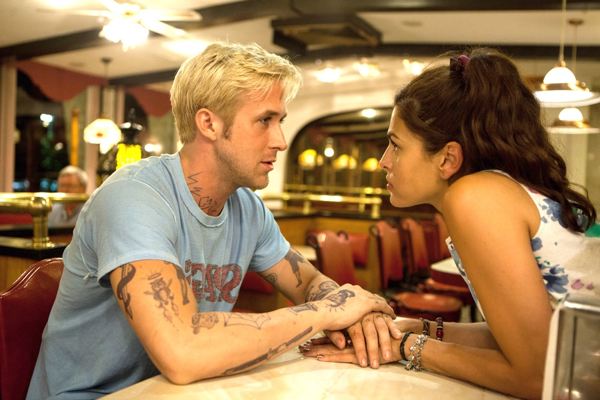Movie review by Greg Carlson
WARNING: The following review reveals key plot information. Read only if you have seen “The Place Beyond the Pines.”
Derek Cianfrance trades the time-jumping, one-on-one marital discord of “Blue Valentine” for the more determined triptych of “The Place Beyond the Pines,” an expectedly moody and atmospheric examination of paternal failure and inescapable generational torment that nods to sources as wide-ranging as “Roustabout” and “Miller’s Crossing.” Selling the movie on the promise of Ryan Gosling as a death-defying motorcyclist who robs banks to provide for the baby he didn’t know he fathered, Cianfrance delivers a “Psycho”-style shock when Gosling’s Luke Glanton is killed just as the audience has grown accustomed to his reckless larceny. The murder of Luke by police officer Avery Cross (Bradley Cooper) provides the first of two significant narrative turning points in which Cianfrance divulges his agenda.
It turns out Cross is no less ruthless than outlaw Glanton, but the privilege afforded him by his upbringing as the offspring of a judge allows room for political ambitions that don’t necessitate armed robbery. Cianfrance might be trying to comment on class (as in societal pecking order) and class (as in character that transcends financial disadvantage), but the film is guarded and cagey on matters of good and bad fortune, morality, and personal responsibility. In his aggressive demolition of the film, Ed Gonzalez calls “The Place Beyond the Pines” a “daisy chain of physical and emotional violence that sacrifices emotional specificity to often-purple marriages of sight and sound.” In light of the director’s way with actors, not all viewers will be this perturbed by Cianfrance’s storytelling proclivities.
In the third story arc, Cianfrance focuses on teenagers AJ (the son of Avery) and Jason (the son of Luke). The director lavishes a surprising amount of attention on AJ (Emory Cohen), a frustrated bully who postures behind the phony affect of mannered slang and grating false bravado. Following the lead of many a soap opera, the boys become friends without knowing that AJ’s dad shot and killed Jason’s dad. AJ’s ugly personality is so pronounced one cannot help but wonder how he managed to develop into a cur, especially when raised with means by Rose Byrne’s sympathetic Jennifer. We’re not supposed to like AJ, but it’s hard not to wonder what happened in the fifteen years skipped over by the director.
In assigning point of view, Cianfrance shortchanged Michelle Williams in “Blue Valentine” and does the same thing to the often invisible women of “The Place Beyond the Pines.” As the mother of Luke’s child, Eva Mendes manages to squeeze every possible drop of humanity from her suffering, noble Romina. Since Cianfrance doesn’t offer, we have to speculate as to the reason Romina would be drawn back to Luke when she has begun building a new, stable life with Kofi (Mahershala Ali), the one male in the film who might be a whole dad. Mendes is every bit as good as the men – maybe better, since she is given so much less emphasis and has fewer scenes in which to make an impression.
In “Blue Valentine,” Cianfrance demonstrated his keen ear for music, and “The Place Beyond the Pines,” from Mike Patton’s score to needle-drops of Bruce Springsteen’s “Dancing in the Dark” and the climactic placement of Bon Iver’s “The Wolves (Act I & II),” marry Gosling’s tough persona to the ineffable cool of song, not unlike the heat generated much the same way in “Drive.” Coincidentally, Springsteen (“State Trooper”) and the very same Bon Iver track were cued up in Jacques Audiard’s “Rust and Bone,” a superior study of a troubled man not fully equipped to be a father.
